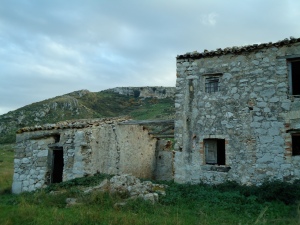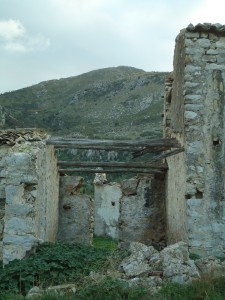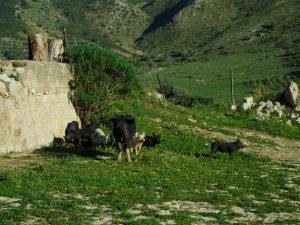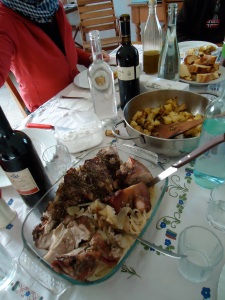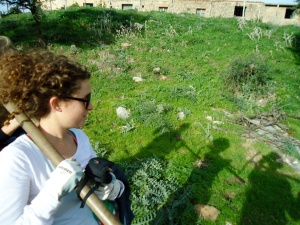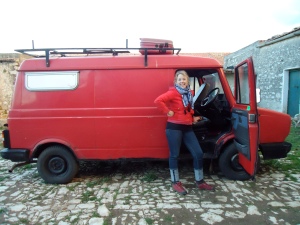Light-skinned and clean-suited, Luigi looked more businessman than farmer and was, in fact, more businessman than farmer. A retired engineer, he’d moved back to Sicily from Bologna to take over the family land after his father passed away. Sitting in the passenger’s seat was his girlfriend Mimma. She’d moved to the country with Luigi, but clearly missed the city life and fashion design career she’d left behind. Petite, buoyant and squeaky-voiced, Mimma kept creatively stimulated by painting and taking sculpting and Spanish writing classes in the city. I could tell right away that it would be her energy keeping things lively around the house.
Half an hour from Palermo, we came to the town of Altavilla. Then, we wound up through dark, rocky hills for fifteen minutes, the wind picking up along the way. The wind didn’t just whistle or howl; it whistled with the gusto of a howl. There was something unsettling about this Dorothy Gale force wind welcoming me to Randino, my new home in the valley. I couldn’t see much outside, but liked what I saw inside. Mimma’s abstracts and small bronze sculptures gave the open house an artistic edge, while weathered wooden doors and furniture reminded you it was a farmhouse.
I was working with another WWOOF couple, Else and Damian (or Damiano as she had taken to calling him). I could tell we’d get along right when I saw Else’s bright smile and Damian’s (he’s the first video) overgrown, curlyish hair. Else is from Norway and Damian’s an Englishman-cum-Irishman. Damian lives alone the forest by the Buddhist monastery he called home for several years. He was more humorous than hermit-reticent, kind of like an old man and a little boy wrapped in one. A drug counselor and certified yoga teacher, Else was warmhearted, calming, intuitive and had immense trouble remembering and pronouncing Italian names.
The description of Randino mentioned olive trees, a garden, fruit trees and lots of land. The land was there, but the olives had been harvested and the vegetables picked. We’d be weeding the oregano. Vincenzo, a gruff but friendly man in his forties, managed the farm. My first morning, he walked us down to 15 endless rows of oregano. Of us three WWOOFers, I was charged with the communication. However, Vincenzo spoke only Sicilian through a cigarette butt. Interpreting Sicilian is not like a New Englander deciphering a Mississippi accent. Even for someone fluent in Italian, Sicilian is like a whole other language. Hand motions would have to do most the talking. He picked up a trowel and dug out a bunch of weeds surrounding the oregano at an impressive pace. We gave him the “okay,” and he left us to work while he tilled the soil in the barley fields and looked over the free-range pigs and cows.
This was by far the most physically taxing job of all my WWOOFing. It was the hard on the back and the first serious arm workout I’d had in months outside of luggage carrying. Most of my farm work required moments of carrying heavy crates, but this was four hours of consistently intense work. Luigi was laid back, so we worked hard on our own volition and would break for the occasional midmorning tea and snack.
The landscape was strange but spectacular; brown cows grazing through miles and miles of rocky, green hills, with the sea off on the horizon. We’d usually have a long, late lunch, often some combination of homegrown pumpkin and pig. On rainy days, Mimma taught us recipes like pumpkin gnocchi and eggplant Parmesan. After lunch, we’d either work a bit more or wander into the hills. It was very serene, except for when that eerie wind returned. Or perhaps it was the neighbor that made things eerie….
I soon learned that Luigi’s meetings in Palermo had been with his lawyer. I had gone from one neighborhood war to another. Luigi’s grandfather had started Randino, buying many hectares of land and running a now-defunct wine vineyard with hundreds of employees. He gave one employee a piece of land to settle and work on, and this man’s son had turned out to be a total loon. The son, though seventy years old and presumably retired, is set on proving that he is entitled to part of Luigi’s land, which Luigi denies. These sorts of disputes happen a lot in the country. Family histories can blur the lines, and there are laws that give those who work a piece of land for a certain number of years ownership of that land.
However, this went way beyond an innocent dispute. It got Fatal Attraction creepy. The neighbor, who we dubbed Asino (donkey) Man, had taken to cutting the fences Luigi built to prevent neighbors’ cows from eating his crops. Last year, he earned his moniker when he murdered Luigi’s fifteen donkeys after they’d wandered onto his property. Yep. Crazy. He put up gates that blocked access to public roads, and took down others built to keep cattle from grazing on public land. And somehow, he got away with it. Mimma and Luigi blamed corruption from the mafia for the lack of response to Asino Man’s transgressions.
When Luigi’s much-anticipated donkey court date was delayed, he didn’t even seem surprised. “Justice in Italy is slow,” he sighed. In his words, I sensed the same sort of I love the kid, but she makes it really difficult to love her when you live with her sentiment I’d gotten from Chiara and Marco.
On the lighter side, Mimma shared tidbits about food, art, fashion and family history. She had a lot to say, but only in Italian (and Spanish), which I appreciated – good practice. One of the first questions she asked me was “If you could be an animal in your next life, which animal would you be?” I loved her curveball of answer. Most people go for a bird (men love eagles), lion, dolphin or whale. Mimma chose the cow for its peacefulness and tranquility.
Those were the kind of conversations that made these workstays so great. With only oregano to weed and garages to clean, I didn’t learn as much about agriculture at Randino as I’d hoped to. Yet once I accepted that it wouldn’t meet all of my expectations, I had a lovely time. That’s the thing with WWOOFing; part of the fun is the element of surprise. Even if you read the listings carefully and ask questions, no farm will be exactly what you imagine. So, you need to size up the situation and decide if the farm’s a “fit” for you. If the shortcomings bother you enough that you’d rather pack your bags and come up with a Plan B, no one’s stopping you. But if you decide to stay, it’s essential to just roll with it and appreciate your new home for all its quirks.


